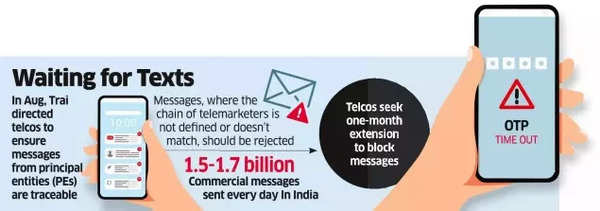No OTP for online transactions? Telecommunications companies have cautioned that a new directive from the industry regulator, set to take effect on November 1, could lead to significant disruptions in the delivery of transactional and service messages. The mandate aims to ensure the traceability of messages sent by principal entities (PEs) such as banks, ecommerce companies, and financial institutions.
According to officials, the Cellular Operators Association of India (COAI), which includes members such as Reliance Jio, Bharti Airtel, and Vodafone Idea, has approached Trai seeking relaxations in implementing the traceability mandate.
As per the Telecom Regulatory Authority of India (TRAI) mandate, telecom operators must ensure that messages from PEs to recipients are traceable starting from November. Messages with undefined or mismatched telemarketer chains should be rejected, meaning that messages with entirely undefined chains must be blocked or not delivered to the customer.
Telecom operators are warning that messages containing OTPs and other critical information may not reach recipients, as telemarketers and PEs have yet to implement the necessary technical solutions, according to an ET report.

Waiting for texts
Industry data reveals that 1.5-1.7 billion commercial messages are sent daily in India, highlighting the potential scale of disruption if messages are blocked or undelivered.
While telecom operators have informed the regulator that their systems are prepared to implement the mandate from November 1, they have also noted that telemarketers and PEs require more time to complete the necessary activities on their end. PEs, in turn, are requesting a two-month extension to the deadline to finalize their implementation.
Also Read | Don’t fall prey to these scams! 10 common ways in which scamsters can fraud you
The telecom companies have requested TRAI to grant them additional time to fully implement the mandate related to commercial messages. According to the telcos, the principal entities (PE) and telemarketers need more time to complete their activities and ensure proper scrubbing of the messaging traffic to minimize any disruption. The industry has proposed to Trai to allow them to implement the mandate in “logger mode” starting from November 1, during which telcos will not block the traffic in case of any discrepancies or non-compliance.
To minimize inconvenience to consumers and ensure a smooth transition, the telcos have informed the regulator that they will provide daily reports to telemarketers and PEs, enabling them to take necessary corrective measures. The telecom companies plan to fully implement the blocking mode by December 1.
This marks the second instance where the telecom industry has requested a one-month extension to comply with Trai’s mandate regarding commercial messages. Previously, the regulator had extended the deadline for whitelisting messages containing URLs, OTT links, and other related information by a month until October 1, following a request from the telcos for more time to set up the required systems. After the extension, the systems are reported to be functioning well, with most PEs and telemarketers having come on board.
Also Read | Who Will Be World’s First Top 10 Trillionaires? Two Indians, Gautam Adani & Mukesh Ambani, Make It To The List! Elon Musk Leads – Check Full List
The whitelisting process requires entities sending commercial messages to provide all relevant information, such as URLs, call-back numbers, and more, to the telecom companies. The telcos then feed this information into their blockchain-based distributed ledger technology (DLT) platform. If the provided information matches the platform’s records, the message is allowed to pass through; otherwise, it is blocked.
Trai has been actively working on various initiatives to curb the misuse of headers and content templates, aiming to create a more secure and efficient telecom ecosystem. The regulator had been encouraging telcos to implement the whitelisting mechanism since May 2023, but the industry was not fully prepared with the necessary infrastructure.
At that time, Trai had instructed the telcos to ensure that only whitelisted URLs, APKs, OTT links, and call-back numbers were included in the content template and to submit a compliance report on the issue within 45 days.





